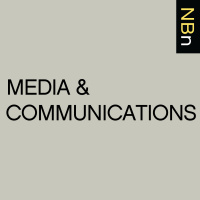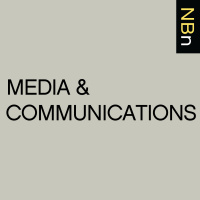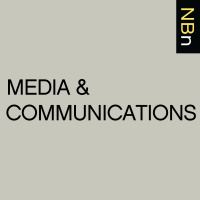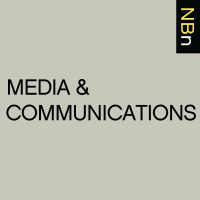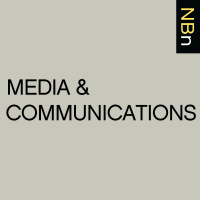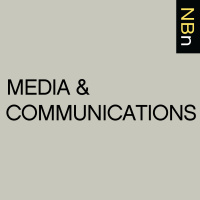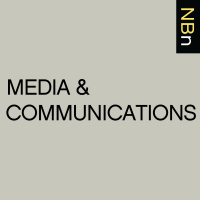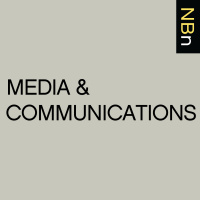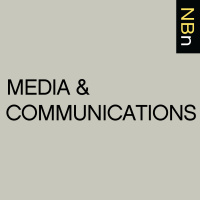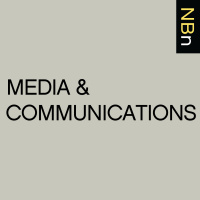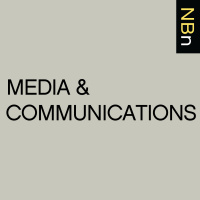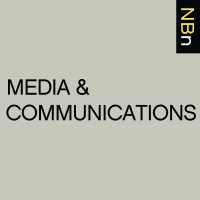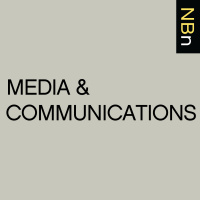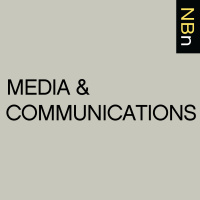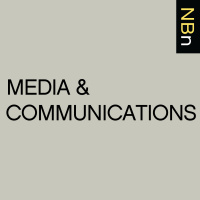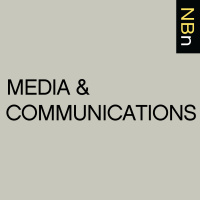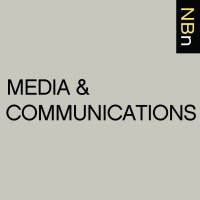New Books In Communications
- Author: Vários
- Narrator: Vários
- Publisher: Podcast
- Duration: 1314:11:27
- More information
Informações:
Synopsis
Interviews with Scholars of Media and Communications about their New Books
Episodes
-
Melissa Aronczyk, “Branding the Nation: The Global Business of National Identity” (Oxford UP, 2013)
04/12/2013 Duration: 56minIn Branding the Nation: The Global Business of National Identity, Melissa Aronczyk locates the rise of nation branding as a response to the perceived need to sculpt national identity in the face of a fiercely competitive global economy. In tracking the history of the nation-branding phenomenon, Aronczyk recounts the rise and spread of the very idea of national “competitiveness,” a discourse that, in effect, created a market that branding specialists then tapped. The book engages with the large scholarly literature on nations and nationalism, arguing that nation branding should not be dismissed as merely the invasion of business practices into the national imaginary–though it has this character, undeniably–but that the practice should also be read as a discourse that maintains, extends, and reconstitutes the nation. Based on dozens of interviews with nation-branding specialist over a five-year period, Aronczyk develops major case studies of Poland and Canada in particular, and substantial treatments of a numbe
-
Thomas Bey William Bailey, “Unofficial Release: Self-Released and Handmade Audio in Post-Industrial Society” (Belsona Books, 2012)
22/11/2013 Duration: 56minThomas Bey William Bailey is the author of Unofficial Release: Self-Released and Handmade Audio in Post-Industrial Society (Belsona Books, 2012). He is a psycho-acoustic sound artist and writer on saturation culture. Thomas traces the history of self-released audio from its origins in mail-art networks of the 1970s to the present day practice of using antiquated media – the humble cassette tape – for the dissemination of experimental sounds. Net-labels, mp3 blogs, tape traders, and their many casts of characters are examined along the way as changing technologies impact the strategies for resilience among self-releasing audio artists. Learn more about your ad choices. Visit megaphone.fm/adchoices
-
Ethan Thompson and Jason Mittell, “How to Watch Television” (NYU Press, 2013)
16/11/2013 Duration: 47minWhat if there was an instruction manual for television? Not just for the casual consumer, but for college students interested in learning about the culture of television, written by some of the field’s top scholars? In How to Watch Television (New York University Press, 2013), editors Ethan Thompson and Jason Mittell have put together a collection of 40 original essays from some of today’s top scholars on television culture. Each essay focuses on a single television show, and each is an example of how to practice media criticism on an academic level. Thompson, Associate Professor at Texas A&M University-Corpus Christi, and Mittell, professor at Middlebury College, also contributed essays to the collection. As the authors explain: “This book, the essays inside it, and the critical methods the authors employ, all seek to expand the ways you think about television.” Learn more about your ad choices. Visit megaphone.fm/adchoices
-
Heidi Campbell, “When Religion Meets New Media” Routledge, 2010
08/10/2013 Duration: 01h05minWhat does religion have to do with technology? Many people think that religious practitioners are inherently opposed to new technological developments. The reality of the situation is that religious communities have a very complex relationship with technology. Heidi Campbell, professor in the Department of Communication at Texas A&M University, examines the intersection religion and technology in When Religion Meets New Media (Routledge, 2010). Her main query is what responses do Jewish, Christian, and Muslim communities have to new forms of media. Campbell pinpoints the various structural components of religious communities’ engagement with technologies through a number of case studies, including the Amr Khaled phenomenon, the Gulen Movement, Shabbat in an Orthodox Jewish home, the “Pause, its prayer time” ad campaign, the Anglican Cathedral in Second Life, Islamic apps, and the kosher cellphone, among several others. In When Religion Meets New Media, she offers a comprehensive theoretical model for investi
-
Allen Salkin “From Scratch: Inside the Food Network” (Putnam, 2013)
05/10/2013 Duration: 01h06minWhen I was growing up the only cooking show on TV I remember was Julia Child. I sometimes watched “The French Chef,” not so much to learn anything about cooking, but rather just to watch Julia. She was a hoot. When I saw the famous “Saturday Night Live” in 1978, I wasn’t sure which was funnier–Dan Aykroyd as Julia or Julia herself. Today, of course, cooking is very serious business on TV and the reason, of course, is the Food Network. It grew from virtually nothing twenty years ago to a massive cultural and economic force. It’s watched by millions and it makes millions more. It’s changed the way Americans (and many overseas) think about both food and television. It’s sky is full of stars. How’d that happen? In his remarkably well researched, wonderfully written and engrossingly told From Scratch: Inside the Food Network (Putnam, 2013), former New York Times reporter Allen Salkin tells the–pardon the pun–saucy tale. Please listen in. Learn more about your ad choices. Visit megaphone.fm/adchoices
-
George Brock, “Out of Print: Newspapers, Journalism and the Business of News in the Digital Age” (Kogan Page, 2013)
27/09/2013 Duration: 40minGeorge Brock approached his book about newspapers and journalism in the digital age unwilling to write another gloom-and-doom narrative about the death or decline of the industry. When he studied the historical development of journalism and current trends, he found the industry is what is always has been: volatile, evolving, and vital to society’s well being. Out of Print: Newspapers, Journalism and the Business of News in the Digital Age (Kogan Page, 2013) is an important look at the industrial, economic, and pragmatic realities of a shifting industry. Using modern case studies, including the phone-hacking scandal that brought down Great Britain’s News of the World, as well as historical research and recent data, Brock examines where journalism was, is and will be. Brock, head of City University London’s prestigious graduate school of journalism, has produced a work that transcends academia without sacrificing methodology or theory. “Because journalism lives on the frontier between democratic purposes and
-
Ian Samson, “Paper: An Elegy” (Harper Collins, 2012)
24/09/2013 Duration: 34minIn our digital world, it does seem like paper is dying by inches. Bookstores are going out of business, and more and more people get their news from the internet than from newspapers. But how irrelevant has paper really become? As Ian Samson argues in his new book, Paper: An Elegy (Harper Collins, 2012), not only is paper still vital in our society, it pretty much dominates all our lives. From advertising to currency, to board games and origami, paper still revolves around most business and leisure. Even “post-paper” products, such as e-readers, imitate the aesthetics and feel of paper, mirroring it in spirit if not in product. And how many of us have heard, “yes, I have an e-book reader, but I just really like the feel of a book in my hand”? In this interview, Ian Samson tells us about the history of paper, its uses throughout time, and our love affair with the “ultimate man-made material.” Learn more about your ad choices. Visit megaphone.fm/adchoices
-
David Beer, “Popular Culture and New Media: The Politics of Circulation” (Palgrave, 2013)
21/09/2013 Duration: 38minPopular Culture and New Media: The Politics of Circulation (Palgrave, 2013) is written by David Beer, a Senior Lecturer in Sociology at York University in the UK. He blogs here and tweets here. The book attempts to describe and analyse the impact of new media on culture and society, using a range of critical theoretical starting points. Its use of theory is especially important to such a fast moving topic. The book aims to have continued and longer term relevance to debates about culture, even as specific technologies come and go, as a result of its theoretical basis David’s book raises a series of challenges for a range of academic areas. Perhaps the most important is the impact of media communications on the sociology of culture. Sociological studies of culture have been slow to consider the impact of new media, as they have tended to focus on debates about the relationship between tastes and class or social status. Popular Culture and New Media argues that the architecture underlying the way many people a
-
Sarah Banet-Weiser, “Authentic: The Politics of Ambivalence in a Brand Culture” (NYU Press, 2013)
27/08/2013 Duration: 57minIn Authentic: The Politics of Ambivalence in a Brand Culture (NYU Press, 2013), Sarah Banet-Weiser scrutinizes the spread of brand culture into other spheres of social life that the market–at least in our imaginations–had left untouched: politics, religion, creativity, and the self. Banet-Weiser observes that the authenticity concept seems to carry more weight in a culture of selling: We have come to expect, and to some extent accept, that authenticity, like everything else, can be trademarked. Through rich case studies–Dove ad campaigns, Facebook self-performance, street art, green activism, and New Age spirituality among them–Authentic identifies the pervasive (and often troubling) ambivalence of branded living. Learn more about your ad choices. Visit megaphone.fm/adchoices
-
Brian Michael Goss, “Rebooting the Herman and Chomsky Propaganda Model in the Twenty-First Century” (Peter Lang, 2013)
22/07/2013 Duration: 44minBrian Michael Goss, professor of communication at St. Louis University in Madrid, has taken one of media’s most studied theories and given it a facelift. In Rebooting the Herman and Chomsky Propaganda Model in the Twenty-First Century (Peter Lang, 2013), Goss revisits the model created by Edward Herman and Noam Chomsky in their 1988 book, Manufacturing Consent. The filters remain, but Goss pushes the model into the modern context of new media models and expanded global exportation. “Far from condemning journalism,” Goss writes, “I hope to see it more closely approximate its mythologies about itself.” “Rebooting” is an important work, relevant not just to scholars, but all consumers of media. Learn more about your ad choices. Visit megaphone.fm/adchoices
-
John O. McGinnis, “Accelerating Democracy: Transforming Governance Through Technology” (Princeton UP, 2013)
10/07/2013 Duration: 01h01minThe advent of very powerful computers and the Internet have not “changed everything,” but it has created a new communications context within which almost everything we do will be somewhat changed. One of the “things we do” is governance, that is, the way we organize ourselves politically and, as a result of that organization, provide for the individual and public good. In his fascinating book Accelerating Democracy: Transforming Governance Through Technology (Princeton UP, 2013), John O. McGinnis examines the promise and peril of advanced computation and Internet communications for our democracy. The former (promise), he says, is great if we think deeply about the impact of the new media on politics and public policy. He proposed that we take the bull by the horns and experiment with new technology so that governance can become both more democratic and more efficient. He suggests a number of ways in which the potential of the new media can be made to do just this. Listen in. Learn more about your ad choices.
-
Michael Serazio, “Your Ad Here: The Cool Sell of Guerrilla Marketing” (NYU Press, 2013)
03/07/2013 Duration: 58min“Power through freedom.” Michael Serazio‘s Your Ad Here: The Cool Sell of Guerrilla Marketing (NYU Press, 2013) traces the mushrooming world of guerrilla marketing–defined to include word-of-mouth, viral, and advergaming, along with a host of other, often hidden kinds of persuasion. The book describes the ways that advertisers give up “control” to consumers through “authentic” discovery, dialogue, amateurism, the non-sell sell, and even anti-marketing messages themselves–all of which serve, paradoxically, to reinforce control and commercialism. The consumer subject, writes Serazio drawing on Foucault and Gramsci, is strategically engaged to act without the sense of being acted upon–a kind “corporate ventriloquism.” The book includes rich, detailed case studies and interviews with marketers, who recount their “cool sell” campaigns for America’s Army, PBR, and Burger King’s “Subservient Chicken.” Learn more about your ad choices. Visit megaphone.fm/adchoices
-
Nicco Mele, “The End of Big: How the Internet Makes David the New Goliath” (St. Martin’s Press, 2013)
24/06/2013 Duration: 37minNicco Mele is the author of The End of Big: How the Internet Makes David the New Goliath (St. Martin’s Press, 2013). He is Adjunct Lecturer in Public Policy at the Kennedy School’s Shorenstein Center on the Press, Politics, and Public Policy, Harvard University. Mele writes as a technology expert and as a witness to history. He served as a campaign staffer for the Howard Dean for President Campaign in 2003. He and his colleagues implemented many of the web-based campaign innovations that resulted in President Obama winning the 2008 presidential election and define the modern American political campaign. Mele links that experience with radical social changes brought about by the internet. His title thesis, The End of Big, suggest that big institutions in nearly every sector of our lives (business, government, news) have been eroded and, in some cases, supplanted by smallness. An enthusiast for technology, Mele also cautions against the risks associated with this transformation. Learn more about your ad choices
-
Dominic Pettman, “Human Error” (UMinnesota, 2011)/”Look at the Bunny” (Zero Books, 2013)
31/05/2013 Duration: 01h15min“The humans are dead.” Whether or not you recognize the epigram from Flight of the Conchords (and if not, there are worse ways to spend a few minutes than by looking here, and I recommend sticking around for the “binary solo”), Dominic Pettman‘s Human Error: Species-Being and Media Machines (University of Minnesota Press, 2011) will likely change the way you think about humanity, animals, machines, and the relationships among them. Pettman uses a series of fascinating case studies, from television programs to films to Sufi fables to pop songs, to explore the notion of Agamben’s “anthropological machines” and the human being as a “technospecies without qualities” in a modern mediascape that includes Thomas Edison’s film Electrocuting an Elephant, Werner Herzog’s Grizzly Man, and the interplanetary soundscape created by NASA (among many, many others). We recently gathered over Skype to talk about some of the major thematic and argumentative threads snaking through this book and Pettman’s recent exploration of
-
Dan Kennedy, “The Wired City: Reimagining Journalism and Civic Life in the Post-Newspaper Age” (UMass Press, 2013)
29/05/2013 Duration: 44minDan Kennedy envisioned a massive book project, a big-picture investigation into current issues facing journalism and media. Instead he found everything he needed in New Haven, Conn., inside the small but productive office of the New Haven Independent. In The Wired City: Reimagining Journalism and Civic Life in the Post-Newspaper Age (University of Massachusetts Press, 2013), Kennedy, assistant professor of journalism at Northeastern University, researches models of journalism that engage public conversation while producing indispensable local news coverage. Although Kennedy’s work includes insight into numerous organizations, the book focuses primarily on the Independent, a non-profit institution in the historical town of New Haven that includes the New Haven Register, a publication that dates back more than two centuries Through interviews and research, Kennedy shows that local journalism in the 21st Century can survive and thrive so long as those within an organization are willing to put in the work and d
-
Douglas Rushkoff, “Present Shock: When Everything Happens Now” (Current, 2013)
21/05/2013 Duration: 34minHumans understand the world through stories, some short and some long. But what happens when the stories become so short that they, well, aren’t stories at all? In Present Shock: When Everything Happens Now (Current, 2013), Douglas Rushkoff explores this question. He points out that always-on, always “new” digital communications have essentially locked us into an ever-more data-rich “moment,” one from which we cannot really escape. The past becomes a few minutes ago; the future a few minutes hence. Of course it’s always always been “now” (as Buddhists will tell you), but now the “now” is far more captivating than ever before. What’s it all mean? Rushkoff explains. Learn more about your ad choices. Visit megaphone.fm/adchoices
-
Muzammil Hussain and Phillip Howard, “Democracy’s Fourth Wave? Digital Media and the Arab Spring” (Oxford UP 2013)
26/04/2013 Duration: 25minMuzammil Hussain and Phillip Howard have authored Democracy’s Fourth Wave? Digital Media and the Arab Spring (Oxford University Press, 2013) which explores the role social media (Twitter, Facebook, and texting) have played in political activism in Tunisia, Egypt, and Lebanon. Hussain is a new Assistant Professor of Global Media Studies at the University of Michigan and Phillip Howard is Professor of Communication, Information, and International Studies at the University of Washington. Through extensive data collection and fieldwork, the authors bring a multi-method and multi-disciplinary approach to their timely subject. They argue that digital activism typically travels through six steps of protest mobilization starting with capacity building and ends with post-protest information war. This is the third book from the Oxford Studies in Digital Politics series featured on the podcast. As with the previous, Political Scientists can learn a lot from the disciplinary perspective brought to the subject of activis
-
David Hochfelder, “The Telegraph in America, 1832-1920” (Johns Hopkins UP, 2012)
23/04/2013 Duration: 44minIn The Telegraph in America, 1832-1920 (Johns Hopkins University Press, 2012), David Hochfelder provides a taut and consistently intelligent history of the telegraph in American life. The book is notable for both its topical breadth—encompassing war, politics, business, journalism, and everyday life—as well as its focused, argument-driven chapters. Hochfelder describes how the telegraph’s important role in the Civil War set the stage for Western Union’s postwar dominance, which in turn provoked persistent efforts to nationalize and regulate telegraphy up through World War I. Hochfelder lingers on two of the telegraph’s principal clients, newspapers and businessmen, focusing in the latter case on the crucial importance of the telegraph-enabled stock “ticker” for modern financial capitalism. The book traces the telegraph’s effect not just on institutions but also the lived experience of ordinary people, who came to hunger for breaking news and real-time stock updates. The patterns of communication established b
-
Martin Kelner, “Sit Down and Cheer: A History of Sport on TV” (Bloomsbury, 2012)
15/04/2013 Duration: 51minI have never been to the Super Bowl, and I will probably never will. I’ve never been to a World Cup match or an Olympic event. I’ve never been to the Final Four or the Rose Bowl. I’ve never been to the Stanley Cup playoffs or the Champions League, the Kentucky Derby or the Masters. The only sporting event of consequence that I’ve ever attended was the World Series. It was game two of a series that went the full seven games. My team won that night, I remember. But I don’t recall much else. I was sitting in the top row, far away in the right-field corner. Certainly, it was fun to be there. But I would have seen more of the game if I had watched it on TV. The history of sports is typically told from the perspective of those who were there, at the stadium: the athletes and managers, the spectators, and the journalists who wrote the first accounts. But most fans watch the great events of sport not in person, but from the comfort of their living room sofa. Even when witnessed from this distance, the events are sti
-
Robert W. McChesney, “Digital Disconnect: How Capitalism is Turning the Internet Against Democracy” (The New Press, 2013)
04/04/2013 Duration: 47minRobert W. McChesney, the celebrated political economist of communication, takes the Internet, industry and government head-on in his latest book, Digital Disconnect: How Capitalism is Turning the Internet Against Democracy (The New Press, 2013). Digital Disconnect builds on McChesney’s previous works, spinning forward his scholarship to construct a remarkably current look at the Internet’s corporate and political landscape. “Almost all of the other books on the Internet, some of which are very good, sort of try to take a larger view of it,” McChesney says during the interview. “Because of where I’m coming from, because of my interests, I think that’s the one thing I could inject that draws from my past research, where I can speak with greater authority, that’s really not talked about by anyone else.” McChesney uses the book to argue that the Internet has become a hub of “numbing commercialism,” largely the result of failed government policies. Writes McChesney: “When the dust clears on this critical juncture,

